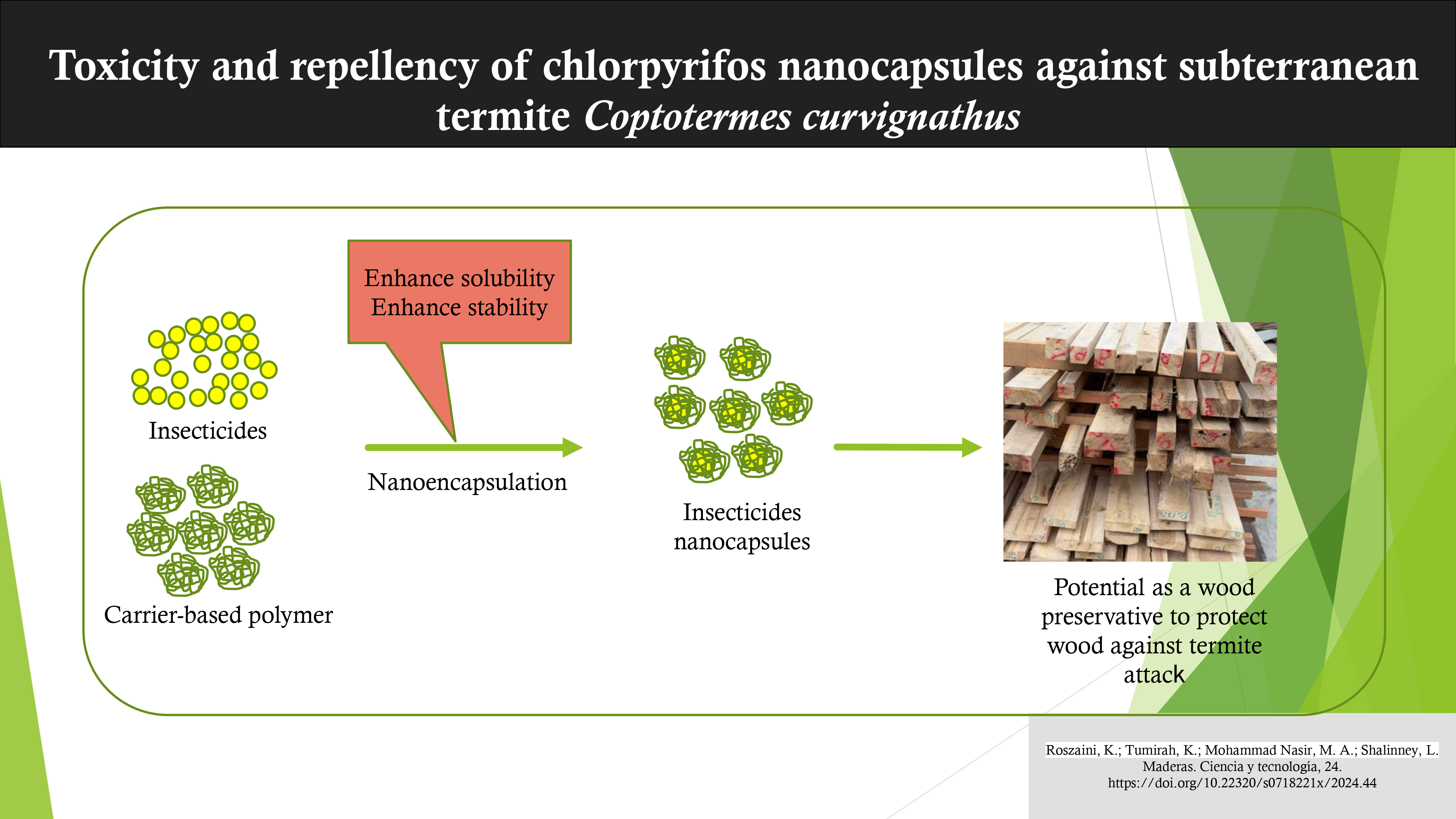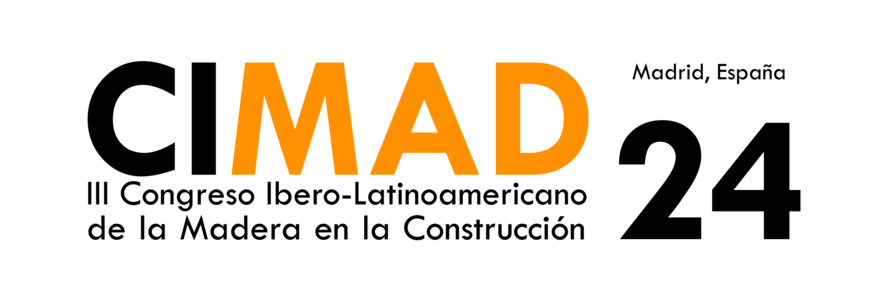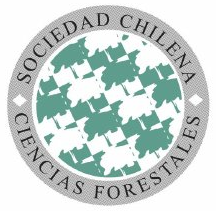Toxicity and repellency of chlorpyrifos nanocapsules against subterranean termite Coptotermes curvignathus
DOI:
https://doi.org/10.22320/s0718221x/2024.44Keywords:
Chlorpyrifos, mortality, nanocapsules, toxicity, repellency, subterranean termiteAbstract
Chlorpyrifos is widely used in agricultural and building industries to control many insects including termites. However, its low aqueous solubility and tendency to decompose under sunlight results in decrease in its efficiency. In the present study, chlorpyrifos was encapsulated into nano-sized poly (styrene-co-maleic anhydrite) using a mini-emulsion in-situ polymerization method to improve the effective utilization rate. The termiticidal properties of nanocapsules at different concentrations (1 - 25 wt%) were tested against subterranean termite; Coptotermes curvignathus. Results of Choice bioassays shows that chlorpyrifos nanocapsules are strongly toxic to Coptotermes curvignathus. The filter paper feeding inhibition and repellent bioassay show a significant feeding inhibition (> 60 %) at lowest concentration of chlorpyrifos nanocapsules. The highest mortality rate of termites (90 %) after 24-h exposure was observed in the sample treated with the highest concentration of chlorpyrifos nanocapsules (25 wt%). Results obtained from this study show that chlorpyrifos nanocapsules have a strong termiticidal property against Coptotermes curvignathus. This indicates that the nanoencapsulation of biocides chlorpyrifos opens a real potential of new and advanced wood preservation technology.
Downloads
References
Abbott, W.S. 1925. A method of computing the effectiveness of an insecticide. Journal of Economic Entomology 18: 265-267. https://pubmed.ncbi.nlm.nih.gov/3333059/
Abdul Majid, A.H.; Ahmad, A.H. 2009. Termite infestation selected from premises in Penang, Seberang Prai and Sungai Petani, Malaysia. Malaysian Applied Biology 38(2): 37-48. https://www.academia.edu/30317493/The_Status_of_Subterranean_Termite_Infestation_in_Penang_Seberang_Perai_and_Kedah_Malaysia
Ahmed, M.A.I.; Eraky, S.A.; Fakeer, M.; Soliman, A.S. 2015. Potential toxicity assessment of novel selected pesticides against sand termite, Psammotermes hypostoma (Desneux workers) (Isoptera: Rhinotermitidae) under field conditions in Egypt. Journal of Plant Protection Research 55(2): 193-197. https://doi.org/10.1515/jppr-2015-0026
Ahmed, S.; Hassan, B.; Yaqoob, M.M.; Nisar, M.S.; Rashid, A. 2017. Efficacy of chlorpyrifos and fipronil in relation to soil depths against subterranean termites. Journal of Entomological and Acarological Research 49(1): 6386-6390. http://doi.org/10.4081/jear.2017.6386
Akpesse, A.A.M.; Coulibaly, T.; Boga, J.P.; Yapi, A.; Kouassi, K.P. 2014. Laboratory evaluation of chlorpyrifos-ethyl and fipronil against Ancistrotermes cavithorax (Isoptera: Termitidae) in South Côte d’Ivoire. International Journal of Agriculture Innovations and Research 3(2): 519-522.
Anon. 2002. Focus on termite control: Chlorpyrifos update. https://www.pctonline.com/article/fo-cus-on-termite-control--chlorpyrifos-update/
Asogwa, E.U.; Okelana, F.A.; Ndubuaku, T.C.N.; Mokwunye, I.U. 2009. The termiticidal effects of chlorpyrifos 48EC, endosulfan 35 EC, dichlorvos 1000 EC and diazinon 600 EC against termites in South-West Nigeria. African Journal of Biotechnology 8(1): 48-52. https://www.ajol.info/index.php/ajb/article/view/59731
Bakry, A.M.; Abbas, S.; Ali, B.; Majeed, H.; Abouelwafa, M.Y.; Mousa, A.; Liang, L. 2016. Microencapsulation of oils: a comprehensive review of benefits, techniques and applications. Comprehensive Reviews in Food Science and Food Safety 15(1): 143-182. https://doi.org/10.1111/1541-4337.12179
Bilenler, T.; Gokbulut, I.; Sislioglu, K.; Karabulut, I. 2015. Antioxidant and antimicrobial properties of thyme essential oil encapsulated in zein particles. Flavour and Fragrance Journal 30: 392-398. https://doi.org/10.1002/ffj.3254
Budarz, J.F.; Cooper, E.M.; Gardner, C.; Hodzic, E.; Ferguson, P.L.; Gunsch, C.K.; Wiesner, M.R. 2019. Chlorpyrifos degradation via photoreactive TiO2 nanoparticles: accessing the impact of a multicomponent degradation scenario. Journal of Hazardous Materials 372: 61-68. https://doi.org/10.1016/j.jhazmat.2017.12.028
Chen, Z.; Qu, Y.; Xiao, D.; Song, L.F.; Zhang, S.H.; Gao, X.W.; Desneux, N.; Song, D.L. 2015. Lethal and social-medicated effects of ten insecticides on the subterranean termite Reticulitermes speratus. Journal of Pest Science 88: 741-751. https://doi.org/10.1007/s10340-015-0656-0
Cheng, S.; Kirton, L.G.; Gurmit, S. 2008. Termite attack on oil palm grown on peat soil: identification of pest species and factors contributing to the problem. Planter 84(991): 659-670. http://dx.doi.org/10.56333/tp.2008.010
Dick, R.B.; Steenland, K.; Krieg, E.F.; Hines, C.J. 2001. Evaluation of acute sensory-motor effects and test sensitivity using termiticide workers exposed to chlorpyrifos. Neurotoxicology and Teratology 23(4): 381- 393. https://doi.org/10.1016/s0892-0362(01)00143-x
Dyer, S.M.; Cattani, M.; Pisaniello, D.L.; Williams, F.M.; Edwards, J.W. 2001. Peripheral cholinesterase inhibition by occupational chlorpyrifos exposure in Australian termiticide applicators. Toxicology 169: 177-185. http://doi.org/10.1016/s0300-483x(01)00509-1
Emamjomeh, L.; Imani, S.; Talebi Jahromi, K.; Moharramipour, S. 2022. Nanoencapsulation en- hances the contact toxicity of Eucalyptus globulus Labill and Zataria multiflora Boiss essential oils against the third instar larvae of Ephestia kuehniella (Lepidoptera: Pyralidae). International Journal of Pest Management 69:207-214. http://dx.doi.org/10.1080/09670874.2020.1871529
Enserink, M.; Hines, P.J.; Vignieri, S.N.; Wigginton, N.S.; Yeston, J.S. 2013. The pesticide paradox. Science 341(6147): 728-279. http://doi.org/10.1126/science.341.6147.728
Fan, R.; Zhang, W.; Li, L.; Jia, L.; Zhao, J.; Zhao, Z.; Peng, S.; Yuan, X.; Chen, Y. 2021. Individual and synergistic toxic effects of carbendazim and chlorpyrifos on zebrafish embryonic development. Chemosphere 280: e130769. http://doi.org/10.1016/j.chemosphere.2021.130769
Ferreira, C.D.; Nunes, I.L. 2019. Oil nanoencapsulation: development, application and incorporation into the food market. Nanoscale Research Letters 14: 1-13. http://doi.org/10.1186/s11671-018-2829-2
Finney, D.J. 1971. Probit analysis. Journal of Pharmaceutical Sciences 60(9): e1432.https://doi.org/10.1002/jps.2600600940
Hassan, B.; Ahmed, S.; Ejaz, M.A. 2018. Persistency of chlorpyrifos and termiban (imidacloprid) in soil against subterranean termites. Journal of Entomological and Acarological Research 50: 7735-7738. http://doi.org/10.4081/jear.2018.7735
Hillock, D.; Bolin, P. 2012. Botanical pest controls. Oklahoma State University.
Huang, B.; Chen, F.; Shen, F.; Qian, K.; Wang, Y.; Sun, C.; Zhao, X.; Cui, B.; Gao, F.; Zeng, Z.; Cui, H. 2018. Advanced in targeted pesticides with environmentally responsive controlled release by nanotechnology. Nanomaterials 8(102): 1-1. http://dx.doi.org/10.3390/nano8020102
Iram, N.; Arshad, M.; Akhter, N. 2013. Evaluation of botanical and synthetic insecticide for the control of Tribolium castaneum (Herbst) (Coleoptera: Tenebrionidae). BioAssay Journal 8: 3-13. http://dx.doi.org/10.14295/ba.v8.0.117
Jones, K.D.; Huang, W.H. 2003. Evaluation of toxicity of the pesticides, chlorpyrifos and arsenic, in the presence of compost humid substances in aqueous systems. Journal of Hazardous Materials 103: 93-105. https://doi.org/10.1016/s0304-3894(03)00227-9
Kamble, S.T.; Davis, R.W. 2005. Innovation in perimeter treatment against subterranean termites (Isop- tera: Rhinotermitidae). In: Proceedings of Fifth International Conference on Urban Pests. Lee, C.Y.; Robinson, W.H. (Eds.). P&Y Design Network, Malaysia. https://www.icup.org.uk/media/ysldazun/icup031.pdf
Karadeniz, M.; Sahin, M.; Sumnu, G. 2018. Enhancement of storage stability of wheat germ oil by encapsulation. Industrial Crops and Products 114: 14-18. https://doi.org/10.1016/j.indcrop.2018.01.068
Kard, B.M.; Mauldin, J.K. 1990. Termiticide field tests-1 989 update. Research Note November 1990. United States Department of Agriculture: USA. https://www.srs.fs.usda.gov/pubs/rn/rn_so363.pdf
Kurnia, A.; Dewi, I.F.; Makmur, R.F.; Sarwoto; Harsanti, E.S. 2021. Effect of chlorpyriphos in the soil on the onion cultivation and its declining. IOP Conference Series: Earth and Environmental Science 648: e012090. https://doi.org/10.1088/1755-1315/648/1/012090
Lasagna, M.; Hielpos, M.S.; Ventura, C.; Mardirosian, M.N.; Martin, G.; Miret, N.; Randi, A.; Nunez, M.; Cocca, C. 2020. Chlorpyrifos subthreshold exposure induces epithelial-mesencyymal transition in breast cancer cells. Ecotoxicology and Environmental Safety 205: e111312. https://doi.org/10.1016/j.eco-env.2020.111312
Liang, W.; Zhao, Y.; Xiao, D.; Cheng, J.; Zhao, J. 2020. A biodegradable water-triggered chitosan/ hydroxypropyl methylcellulose pesticide mulch film for sustained control of Phytophthora sojae in soybean (Glycine max L. Merr.). Journal of Cleaner Production 245: e118943. https://doi.org/10.1016/j.jcle-pro.2019.118943
Liu, Y.; Laks, P.; Heiden, P. 2002. Controlled released of biocides in solid wood. II. Effficiency against Trametes versicolor and Gloeophyllum trabeum wood decay fungi. Journal of Applied Polymer Science 86(3): 608-614. https://doi.org/10.1002/app.10897
Maia, F.; Tedim, J.; Lisenkov, A.D.; Salak, A.N.; Zheludkevich, M.L.; Ferreira, M.G. 2012. Silica nanocontainers for active corrosion protection. Nanoscale 4: 1287-1298. https://doi.org/10.1039/c2nr11536k
Manager, S.; Singh, N.B. 2001. Application of insecticide for termite control and its effect on yield contributing characters in sugarcane. Sugar Tech 3: 146-153. https://doi.org/10.1007/BF02956807
Mattos, B.D.; da Silva, L.R.; de Souza, I.R.; Magalhães, W.L.E.; Leme, D.M. 2019. Slow delivery of biocide from nanostructured, microscaled, particles reduces its phytoxicity: A model investigation. Journal of Hazardous Materials 5(367): 513-519. https://doi.org/10.1016/j.jhazmat.2018.12.117
Oliveira, J.L.D.; Campos, E.V.R.; Pereira, A.E.S.; Pasquoto, T.; Lima, R.; Grillo, R.; Andrade, D.J.; de Santos, F.A.D.; Fraceto, L.F. 2018. Zein nanoparticles as eco-friendly carrier systems for botanical repellents aiming sustainable agriculture. Journal of Agricultural and Food Chemistry 66: 1330-1340. https://doi.org/10.1021/acs.jafc.7b05552
Paul, E.R.; Lydia, G.H.F. 2011. Chapter 3: The chemical industry. Risks of hazardous wastes, 1st ed., Elsevier: Amsterdam, The Netherland. https://doi.org/10.1016/B978-1-4377-7842-7.00040-4
Qasim, M.; Majeed, M.Z.; Arshad, M.; Abbas, U.; Shehzad, M.Z.; Muhammad Raza, A.B. 2022. In-vitro toxicity of synthetic insecticides against subterranean termites, Coptotermes heimi (Isoptera: Rhinoter- mitidae). Pakistan Journal of Zoology 56(4):1879-1886. https://doi.org/10.17582/journal.pjz/20221110111139
Roszaini, K.; Nor Azah, M.A.; Mailina, J.; Zaini, S.; Mohammad Faridz, Z. 2013. Toxicity and anti- termite activity of the essential oils from Cinnamomum camphora, Cymbopogon nardus, Melaleuca cajuputi and Dipterocarpus sp. against Coptotermes curvignathus. Wood Science and Technology 47(6): 1273-1284. https://doi.org/10.1007/s00226-013-0576-1
Roszaini, K.; Nashatul-Zaimah, N.A.; Noor Azah, M.A. 2020. Potential of Upuna borneensis and Shorea longisperma seed extracts against Coptotermes gestroi. Journal of Tropical Forest Science 32(1): 83-91. http://dx.doi.org/10.26525/jtfs32.1.83
Roy, A.; Bajpai, J.; Bajpai, A.K. 2009. Dynamics of controlled release of chlorpyrifos from swelling and eroding biopolymers microspheres of calcium alginate and starch. Carbohydrate Polymers 76(2): 222-231. https://doi.org/10.1016/j.carbpol.2008.10.013
Ruggiero, L.; Di Bartolomeo, E.; Gasperi, T.; Luisetto, I.; Talone, A.; Zurlo, F.; Peddis, D.; Ricci, M.A.; Sodo, A. 2019. Silica nanosystems for active antifouling protection: nanocapsules and mesoporous nanoparticles in controlled release applications. Journal of Alloys and Compounds 798: 144-148. https://doi.org/10.1016/j.jallcom.2019.05.215
Sabbouri, H.E.K.E.; Gay-Queheillard, J.; Joumaa, W.H.; Delanaud, S.; Guibourdenche, M.; Daw- wiche, W.; Djekkoun, N.; Bach, N.; Ramadan, W. 2020. Does the perigestational exposure to chlorpyrifos and/or high-fat diet affect respiratory parameters and diaphragmatic muscle contractility in young rats? Food and Chemical Toxicology 140: e111322. http://doi.org/10.1016/j.fct.2020.111322
Salem, M.Z.M.; Ali, M.F.; Mansour, M.M.A.; Ali, H.M.; Abdel Moneim, E.M.; Abdel-Megeed, A. 2020. Anti-termitic activity of three plant extracts, chlorpyrifos and a biogent compound (Protect) against termite Microcerotermes eugnathus Silvestri (Blattodea: Termitidae) in Egypt. Insects 11: 756-770. https://doi.org/10.3390/insects11110756
Song, S.; Wang, Y.; Xie, J.; Sun, B.; Zhou, N.; Shen, H.; Shen, J. 2019. Carboxymethyl chitosan modified carbon nanoparticles for controlled emamectin benzoate delivery: improved solubility, pH-responsive release, and sustainable pest control. ACS Applied Materials & Interfaces 11(37): 34258-34267. https://doi.org/10.1021/acsami.9b12564
Srihayu Harsanti, E.S.; Martono, E.; Sudibyakto, H.A.; Sugiharto, E. 2015. Residu insektisida klorpirifos dalam tanah dan produk bawang merah Allium ascalonicum L. di sentra produksi bawang merah di Kabupanten Bantul Yogyakarta. Ecolab 9(1): 26-35. https://doi.org/10.20886/jklh.2015.9.1.26-35
Subekti, N.; Nur, H.; Fanidya, A.; Susanti, S.; Saputri, R.; Indrawati, P. 2019. Chlorpyrifos organo- phosphate and essential oils activities against Callosobruchus maculatus (F.) warehouse pests. Journal of Physics: Conference Series 1402: e055024. https://doi.org/10.1088/1742-6596/1402/5/055024
Tontul, I.; Eroglu, E.; Topuz, A. 2017. Nanoencapsulation of fish oil and essential fatty acids. In Nano-encapsulation of Food Bioactive Ingredients Academic Press. ISBN 97801280974032017: 103-144. https://doi.org/10.1016/B978-0-12-809740-3.00003-9
UNEP. 2008. Finding alternatives to persistent organic pollutants (POPs) for termite management. Stockholm, Sweden. https://nature.berkeley.edu/upmc/documents/UN_termite.pdf
Venkateswara Rao, J.; Parvathi, K.; Kavitha, P.; Jakka, N.M.; Pallela, R. 2005. Effect of chlorpyrifos and monocrotophos on locomotor behaviour and acetylcholinesterase activity of subterranean termites, Odontotermes obesus. Pest Management Science 61(4): 417-421. https://doi.org/10.1002/ps.986
Ye, Z.; Guo, J.J.; Wu, D.W.; Tan, M.Y.; Xiong, X.; Yin, Y.H.; He, G.H. 2015. Photo-responsive shell cross-linked micelles based on carboxymethyl chitosan and their application in controlled release of pesticide. Carbohydrate Polymers 132: 520-528. https://doi.org/10.1016/j.carbpol.2015.06.077
Zheng, T.; Chen, K.; Chen, W.; Wu, B.; Sheng, Y.; Xiao, Y. 2019. Preparation and characterisation of polylactic acid modified polyurethane microcapsules for controlled-release of chlorpyrifos. Journal of Micro- encapsulation 36(1): 62-71. https://doi.org/10.1080/02652048.2019.1599075

Downloads
Published
How to Cite
Issue
Section
License

This work is licensed under a Creative Commons Attribution 4.0 International License.
Los autores/as conservarán sus derechos de autor y garantizarán a la revista el derecho de primera publicación de su obra, el cuál estará simultáneamente sujeto a la Licencia de Reconocimiento de Creative Commons CC-BY que permite a terceros compartir la obra siempre que se indique su autor y su primera publicación esta revista.



































